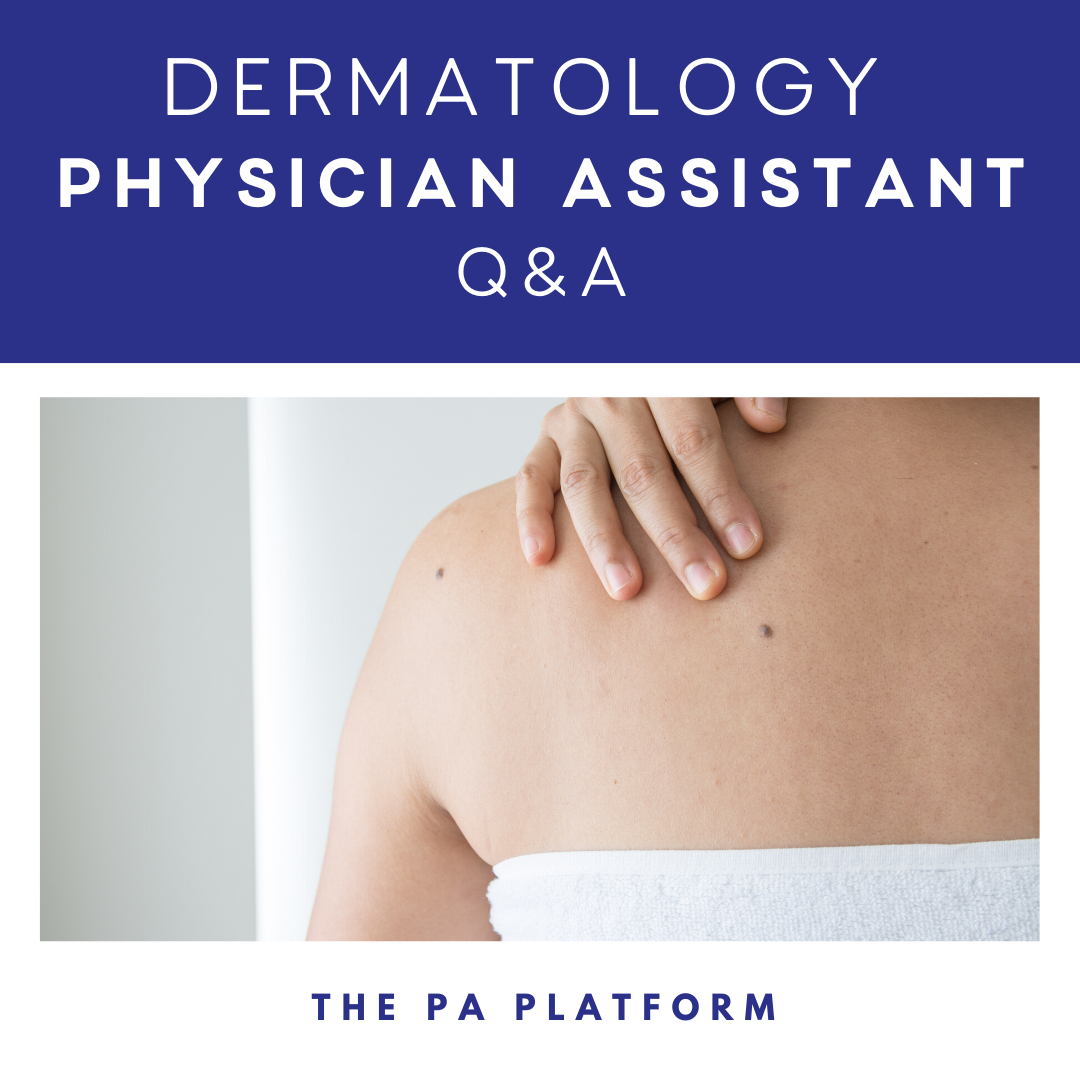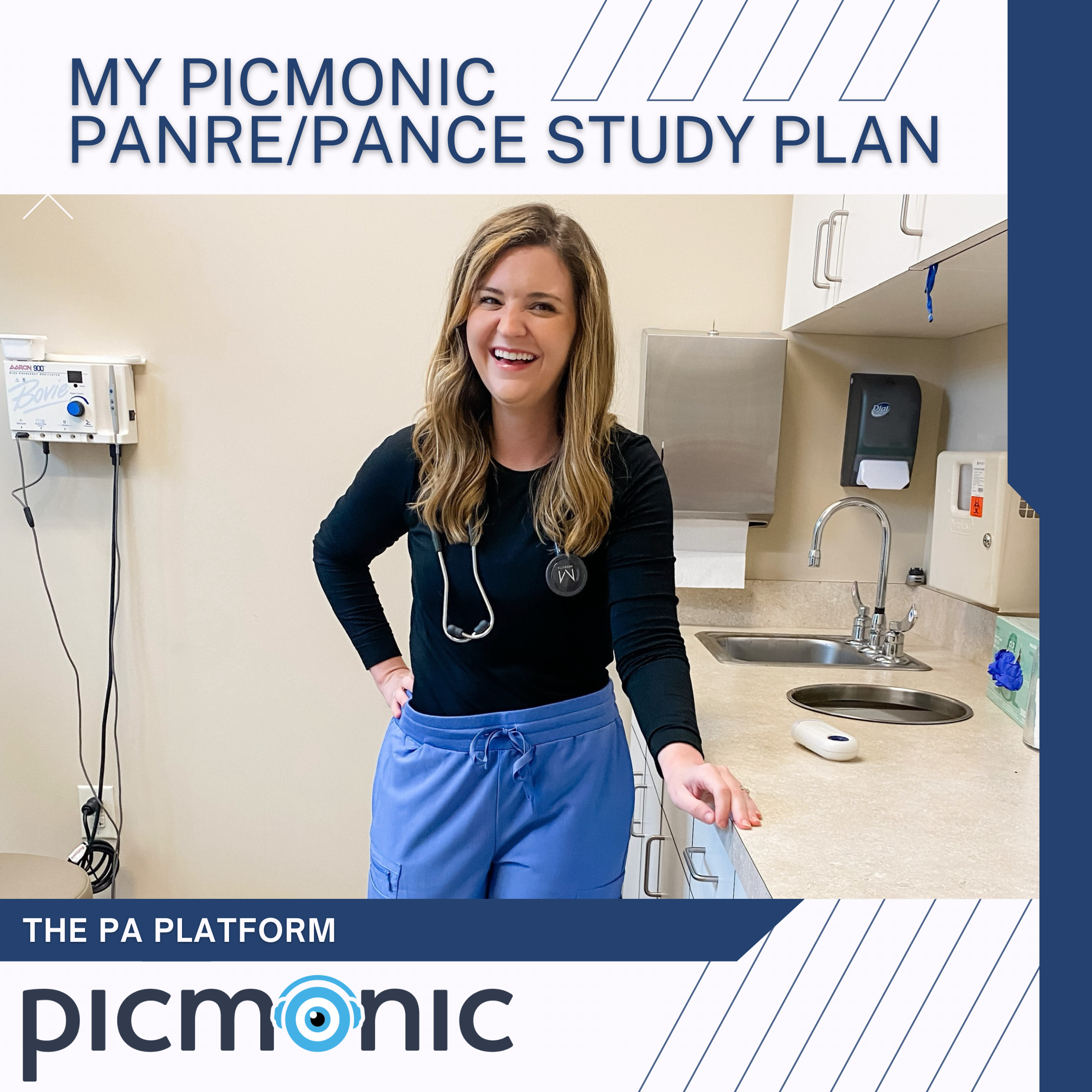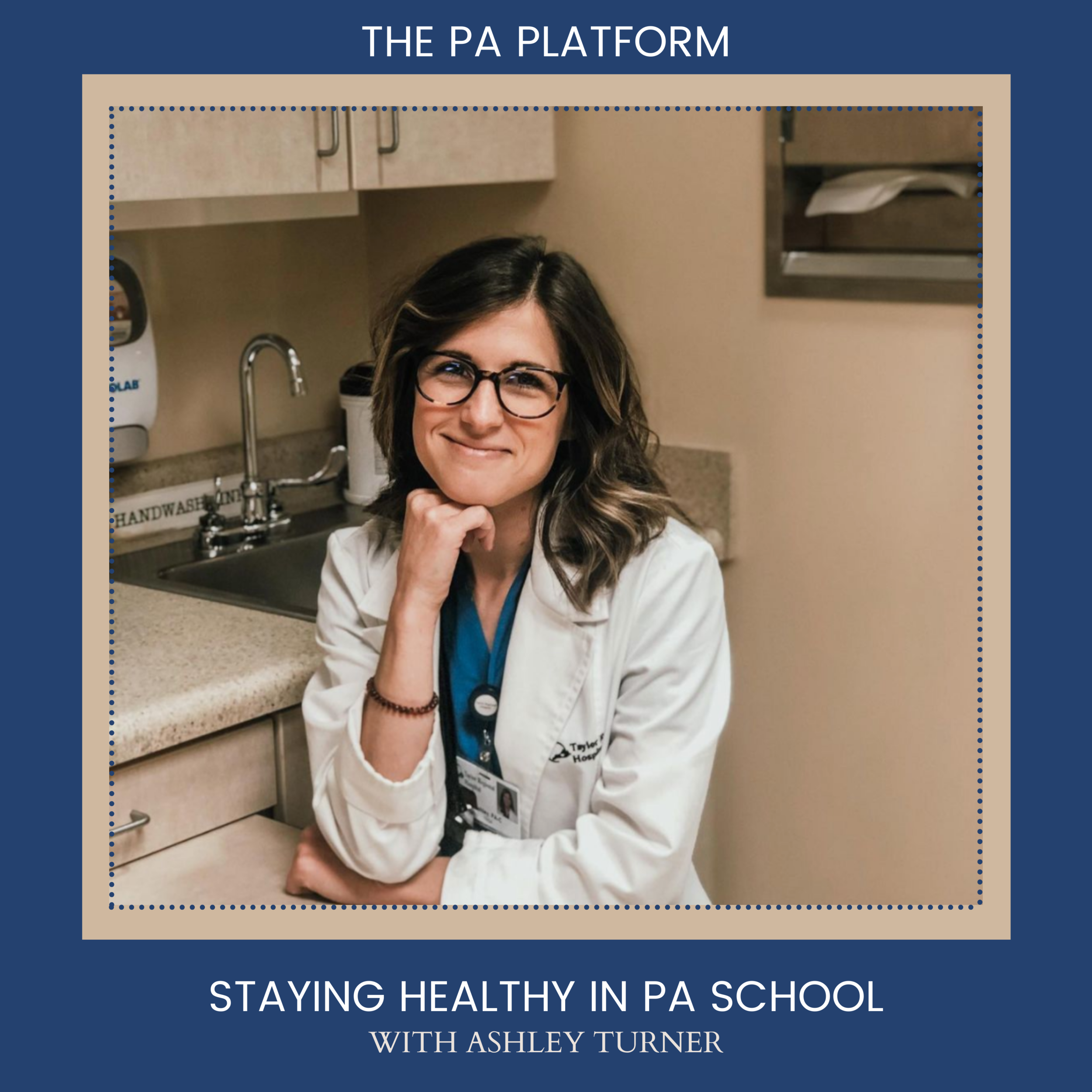A few weeks ago, I posted a question box on my Instagram stories what questions you have about being a dermatology PA. I received well over 100 questions and I some of them in my Instagram Stories (check out my Derm PA Life highlight) and in a podcast episode over on The Pre-PA Club.
A little bit about me, I am a PA and I have been practicing for a little over 5 years now. I have only ever worked in dermatology but this is my second practice I have worked at. You can read more about my journey to becoming a PA here. I absolutely love my job.
How did you get into dermatology?
When I was in college, I was looking for shadowing hours because I knew I wanted to be a PA. The only place that I could get to call me back when I was in undergrad at UGA was a dermatology office. There was an amazing PA there who let me shadow here. I went in a few times a month for an afternoon to get my shadowing hours. My mindset at first was that shadowing was going to be a long and boring process. I was under the assumption that all dermatology was was acne and naked old people — (which there is a lot of!) but I found dermatology to be very interesting.
One thing I didn’t realize until I started working/shadowing in medicine is that dermatology is unique in the sense that you get to see visibly what is happening. you get to see the pathology rather than guessing from looking at numbers. There is a little bit of instant gratification when you can see someone getting better.
Do you ever get squeamish when with a patient?
The very first time I saw a punch biopsy (right above the knee) when I was shadowing I had to excuse myself from the room because I felt sick. I didn’t expect the skin to be as deep as it was. The way a punch biopsy works is you numb the area and then you take what looks like a cookie cutter and push it and spin it into the skin with a little bit of pressure. Once you pull it out, you can see all of the layers (the epidermis, the dermis, and the subcutaneous fat). It really freaked me out! The PA I was shadowing looked over at me and asked if I need to take a minute or sit down. Now I do punch biopsies all day and they no longer bother me. If you are squeamish, I definitely think it is something you can overcome during rotations.
What Does the Work Schedule Look Like? Is it like office hours?
i have always had a clinic schedule because i work in a private office. In September switch to part time so I only work Mondays and Tuesdays right now — I may add Fridays in the future. I get there around 8 and leave by 5. I always have a lunch break (unless I am running behind) where sometimes a drug rep will take us out or I will run to the store or even swing by the house. I try to plan surgeries or cosmetic procedures right before lunch incase I run over.
At my old job I worked 4 1/2 days with a rotating Fridays. I have heard of Derm offices that either open earlier or later or work on weekends, sometimes two.
How do you keep up with charting when you see so many patients in a day?
I want to preface this by saying that every PA and every office has a different procedure for charting. You will see this when you are shadowing.
The office I am at right now is very unique. They have found a way to have a hybrid paper chart and EMR system. They haven’t quite given up on the paper chart because it is really easy to file and find what you are looking for. At my old office, we had an EMR system and I would literally sit in front of a computer all day. Now I hardly ever touch a computer. It was a huge change but I don’t really mind it.
How charting works in my office is:
The patient checks in and they bring us the chart
The medical assistant will take the patient back and get their history and update the chart as needed
They will let me know the patients ready when the chart is outside of the door
I will go in and talk to the patient. I will do my physical exam and decide what I want to do
The MA is taking notes in the chart during that time
I come out and I try to dictate right away. I dictate with my phone and I essentially read my note
The nice part about dermatology is that a lot of stuff is pretty repetitive. I can speed through and add in any details that I need to. There are a few templates that I can use but I typically dictate, send off and then a few days later I will get the paper chart back where I can sign off on my notes and make sure everything is correct. It is kind of an interesting system but I never take my work home with me and I never leave anything for the next day.
How many patients do you see per day?
At my old office (when I was full-time), I was seeing around 35 patients per day. I saw a lot of those patients for several years. When I started at my new office, I am essentially building up my practice from scratch. Now I see about 25 patients per day which I expect for it to increase as time goes one.
What type of patients do you see?
I recently saw a patient who is 103! She was the oldest patient I have ever seen. I see patients of all ages — babies and infants all the way to elderly people — with all different kind of issues and conditions.
What types of procedures do you do?
At my new practice, I am getting to do my surgeries and procedures such as cosmetic fillers, botox and peels. I also get a lot of incisions and skin cancers. I do all of my diagnostic procedures as far as biopsies and shaves, punches, and freezing things.
Do you see most patients for routine skin checks or specific skin issues?
I see a huge variety. Definitely some skin checks, surveillance for skin cancer or weird spots and also a lot of triages and being the newest person I see a lot of new patients with acne, psoriasis, eczema and weird spots.
What is your favorite and least favorite part about working in dermatology?
My favorite - I love treating teenagers and acne. It is really rewarding to see them improve, get better and regain their confidence. Acne is fairly straightforward. There are only so many options and it is like a puzzle trying to put them all together. Sometimes teenagers can be a little reluctant to talk to their provider and give details but deep down, they are cool kids and I like getting to help them with their skin. Even as an adult and a derm PA, I still deal with breakouts and thinking back to high school, I wish someone would have validated the fact that it makes you self conscious when you break out.
My least favorite - draining cysts. i am not Dr. Pimple Popper — they smell.
Did you have a difficult time diagnosing when you first began?
Yes and no. In PA school, I had two weeks of dermatology. I got hired at my first job in April and graduated in August so I was able to set up my last two elective rotations in derm at my job in June and July. I’ll be honest, the first six months, when I would get home, I was exhausted from how much I was learning. It was difficult at the beginning and I just didn’t feel completely comfortable which has obviously changed as I have practiced more.
The first thing was psoriasis — it can be overwhelming and there are a lot of medicines plus it can look different for different patients. It took me a while to be comfortable with it.
Pediatrics is something that I would say I struggled more with because we don’t see babies and kids all of the time and their skin can be so different.
What you will find, though, in rotations and at your job is that you’re not going to know everything at the beginning and it will take a while to figure out what you do need to know. You will eventually feed comfortable. I think it took me about six months and I started to feel pretty confident.
What do you tell your patients if your unsure of the solution to the problem?
Going off the previous question, after working in derm for 5.5 years, I know what I don’t know. If there is ever a question, even if something doesn’t seem straightforward or if I have a little bit of doubt, I will ask for another opinion.
How much autonomy do you get?
This is also related to the previous question. I will say I get as much autonomy as I want. In my practice there is the physician and then another PA. The physician is usually there when I'm there. On Monday morning she goes to the prison and does clinic there but she's always reachable by phone if needed. We all consult each other. I have no shame and if I see something weird or that I am unsure of, I will ask my phsician to come in and take a look. She is more than happy to! She jokes that she loves the weird stuff and she never gets to see it which is so true because I am seeing all of the new patients and all the triage. A lot of times, I am pretty sure of what I want to do as far as a plan or diagnosis but I like to have that confirmation.
Working two days per week, I would say I only bring her in a few times per month. As a PA it is important to be confident in what you know but also know what you don’t know and be willing to ask for help.
What would you change about the Derm PA specialty if anything?
When you look at jobs or specialties, one thing to keep in mind is the type of lifestyle you want to have. There are two different types of work for PAs — clinical scheduled work and shift work.
As a dermatology PA, I can be fully booked 3-6 months out with patients so that can make it difficult to plan things. If you are full-time, working in a clinic Monday - Friday, you are probably going to have a limited about of vacation that you have to plan 6 months in advance. Things do come up but out of respect for patients and the office staff, you really have to be a planner. Trying to find a new spot for 35 patients is very difficult for the office staff.
Alternatively, is to work as like a hospitalist or shift work. My husband, for example is a hospitalist and his schedule is 7 days on and 7 days off which is nice because he always has these big breaks. If you are someone who likes to get up and go, being in a job like a hospitalist, in an emergency room or urgent care where you have shifts and not necessarily a schedule of patients expecting to see specifically you may be a better fit.
Not necessarily something I would change, just something to be aware of when looking for a job.
One thing that I wish I could change is that I wish patients understood their insurance more — I am sure every one in the medical field wishes this but especially in derm. A lot of times, patients come in and thing we can just cut off all of their moles or fix this spot because they hate it but it doesn’t work like that. Health insurance is there if something is harmful or malignant, not because you hate it. It can get a little old saying it over and over again to patients.
How do you manage being a PA while being a mom of a little one?
It's hard to be a PA, a mom, and a wife. What has really helped me is balancing and time blocking. When I am home I try really hard to be present. In the morning, we all hang out as a family and have breakfast together. My baby understands that I have to go to work but I live pretty close to my practice so I try to come home at lunch sometimes. When I get home from work, again I try to really be present and put my phone down. Once she goes to bed, I will work on emails, record podcast episodes and work on things for The PA Platform.
If you have any other questions, leave them in the comments below! If you liked this post let me know!!

















